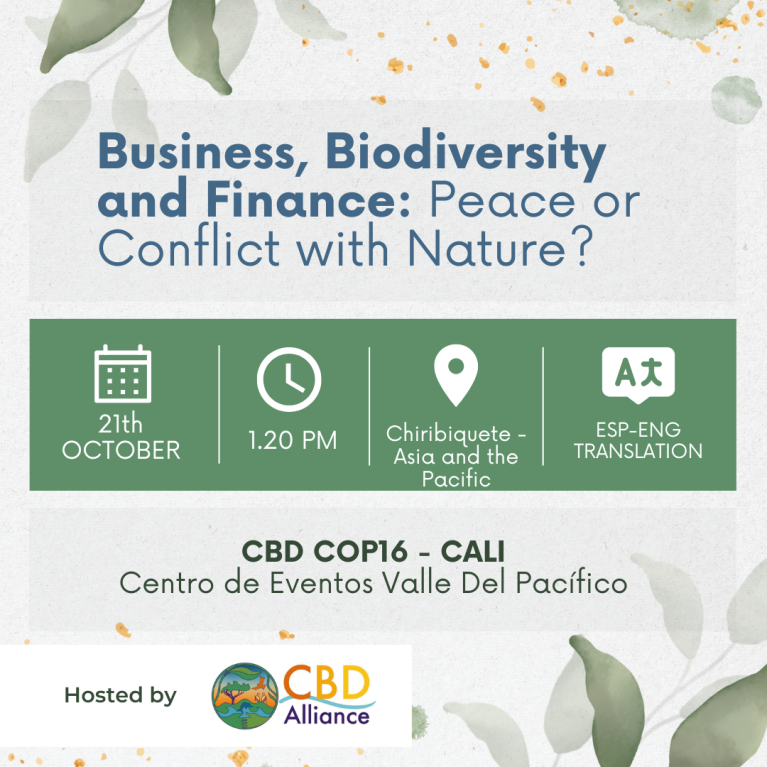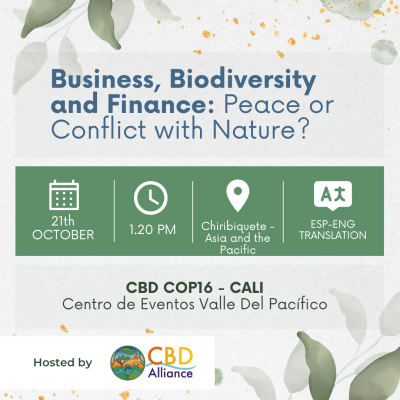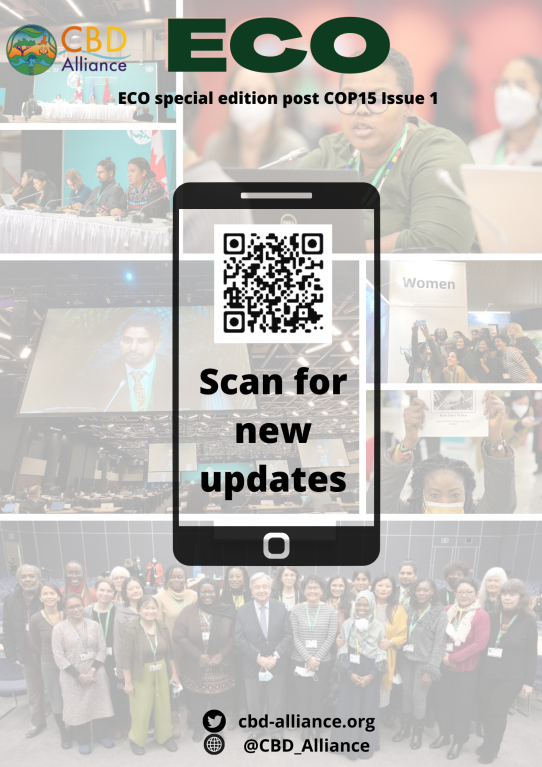ECO 70 (1-10) as they were created and distributed during COP16 in Cali.
Cartagena Protocol
Side events at COP16

Side events are organized
- at the COP venue (Blue zone)
- in the Green zone in Cali itself
Below is a list of side events, both in the Blue and Green Zone. Please contact us if your event is missing here.

Monday, 21 October
Business, Biodiversity and Finance: Peace or Conflict with Nature?
CBD Alliance - Monday, 21 October, 13:20 - Blue Zone: Chiribiquete, Asia and the Pacific room
In this side event, we will evaluate the different proposals made by businesses and other actors with vested interests to contribute to Peace with Nature.
Do climate and biodiversity offsets and credits, bioenergy, synthetic biology, and gene drives contribute to peace between humans, and between humanity and nature? Or will they lead to more conflict?
How can the CBD protect IPs/LCs, women, youth, and small farmers and fishers who generate, restore and protect biodiversity and feed millions without destructive impacts on biodiversity? And how should finance be transformed so that it contributes to true peace with Nature?
Biodiversity Offsets and Credits: examining risks and challenges
Tuesday, 22 October
Gender-responsive and Rights-based Approach to Halt Biodiversity Loss: Peoples’ Solutions to Save the Planet
Side event - Tuesday, 22 October - Global Forest Coalition
Wednesday, 23 October
Women’s Land, Coastal and Water Rights: From Global Commitments to Local Actions
CBD Women Caucus | ILC | ICCA Consortium | and others - Wednesday, 23 October, 11:40 - Blue Zone: Cocuy, Marie Khan Women's Caucus meeting room
Breaking Ground on Youth Indicators for Biodiversity
GYBN | UNESCO - Wednesday, 23 October, 15:00 - Blue Zone: Mavecure, Business and Industry Organizations room
Climate geoengineering and biodiversity - why the CBD needs to affirm precaution
ETC Group | HBF | TWN | IEN | CIEL | CoA - Wednesday, 23 October, 16:30 - Blue Zone: Cano Cristales, CEE room
Current guidance on risk assessment with focus on gene drive organisms is unfit for purpose
Thursday, 24 October
Look Before We Leap: Why the CBD Needs Horizon Scanning, Monitoring and Assessment
EcoNexus | ETC Group | CBD Women Caucus - Thursday, 24 October, 15:00 - Blue Zone: Sanquianga, GRULAC
Biodiversity and Climate Change: when policies collide
FOE | ECONEXUS - Thursday, 24 October, 15:00 - Blue Zone: Paramos, NGO room
Incentives for Target 22: Spotlighting Investor-ready Youth-led Solutions Towards Effective Implementation of the Biodiversity Plan in Africa
Friday, 25 October
Monday, 28 October
Regulating Finance - A precondition to implementing the Global Biodiversity Framework
Monday, 28 October, 7:30-9:00 - Forests & Finance Coalition - Green zone, Banco de Bogotá, Main Auditorium
Why development banks must stop financing factory farming
Green zone - Monday, 28 October - Stop Financing Farming Coalition, Global Forest Coalition
Tuesday, 29 October
Wednesday, 30 October
Thursday, 31 October
date and time to be confirmed
Can KM-GBF stop Biodiversity Loss? The Challenges and Opportunities
Blue zone event - tbc - Global Forest Coalition
Achieving the KM-GBF Targets Through Small-Scale Fisheries (SSF)Youth Participation
Implementation of the SSF Guidelines and a Human Rights-Based Approach towards Coastal and Marine Conservation
tbc - Side event - tbc - CoopeSoliDar, ICSF and the SSF movements
GE trees
Press conference - Time and date: tbc - Global Justice Ecology Project
Material: https://stopgetrees.org/open-letter/
List of side events organized by members of the CBD Alliances [to be completed].
ECO 66(1) Special Post-COP 15 edition

1. The simple 30x30 should make us tremble: We must do it right this time!. Vivienne Solís Rivera and Marvin Fonseca Borrás, CoopeSoliDar R.L - Costa Rica
2. Fair and equitable benefit sharing for use of DSI, without compromising sovereign rights. Nithin Ramakrishnan, Third World Network
3. Outcomes of COP 15: Synbio, techno-fixes, and false solutions need to be challenged nationally. Sabrina Masinjila, African Centre for Biodiversity
4. Agriculture at COP15. Helena Paul, Econexus
5. “Nature Positive” was problematic – but is its absence from the GBF sufficient to prevent harmful offsetting?. Nele Marien, Friends of the Earth International
6. Is the GBF equitable and transformative?. Lim Li Lin, Third World Network
7. Human rights in the GBF: a new paradigm for advancing implementation and accountability. Ana Di Pangracio, Fundación Ambiente y Recursos Naturales (FARN)
8. Our strengths, their weaknesses: Youth reflections on the outcomes of COP15. Global Youth Biodiversity Network
9. What did COP15 bring for women and girls?. Amelia Arreguin, UNCBD Women’s Caucus Coordinator
10. Faiths at COP 15. Grove Harris, Temple of Understanding
CBDA COP15 Closing statement
Thank you Mr President,
I am speaking on behalf of the CBD Alliance.
We regret the process by which the package was adopted early this morning. It was unjust and unfair. Decisions in this COP are adopted by consensus and we did not see consensus. Much more effort could have been made to arrive at consensus.
Mr President,
We welcome Targets 22 and 23 of the Global Biodiversity Framework (GBF) on rights, participation and gender, and will closely monitor their implementation. We also welcome language on the clear respect for the rights of indigenous peoples and local communities.
But we remain concerned that the GBF does not address root causes of biodiversity loss, and worse, systematically incorporates injustices. This could undermine these targets.
The cause of the biodiversity crisis is a system that places corporate profit and power over people and nature and allows corporate interests to influence the outcomes.
Our governments have regrettably ceded their responsibilities to regulate the private business and finance sector, only “encouraging and enabling” business to report and to label products, moving responsibility to consumers. These will not change the actual impact on biodiversity. There are no accountability measures or responsibility for damage done.
The interests of big agribusiness and the biotechnology industry have also permeated the GBF, with ‘innovation’ as a mantra for techno-fix approaches. There are no horizon scanning mechanisms to help ensure future technologies will not be damaging to biodiversity or people. Precaution has been sidelined.
Moreover, governments have invited corporate interests in, allowing developed country Parties to escape from their legally binding obligations to provide new and additional financial resources, by replacing it with private finance, blended finance and innovative financial schemes, including market-based mechanisms such as biodiversity offsets and credits.
The embrace of offsetting approaches, including Nature-Based Solutions, will not halt environmental damage and ecosystem loss. The promise to compensate for biodiversity loss, by protecting similar ecosystems elsewhere justifies continued biodiversity loss and allows business-as-usual, causing human rights violations and other injustices.
Equity is subverted in this framework. The financial amounts on the table are hugely insufficient, and do not acknowledge the ecological debt that the developed world owes to the poor.
The proposed Trust Fund to be established under the Global Environment Facility (GEF) means that all of the current problems will continue and even worsen. Whatever entity is eventually designated as the Global Biodiversity Fund should not allow the private sector and philanthropic foundations to become part of the governance structure, allowing for unfettered influence of unaccountable entities.
This framework will not deliver substantive transformational change, therefore it is not ambitious. We cannot solve the biodiversity crisis using the same system that caused it.
Thank you.

